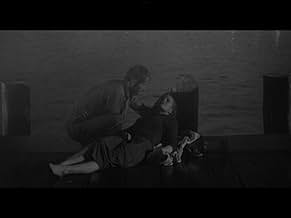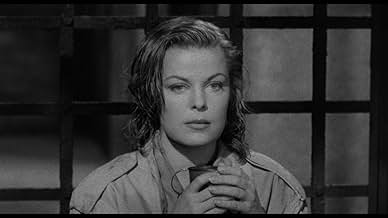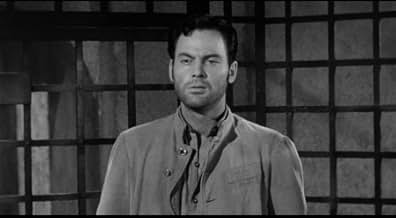NOTE IMDb
6,5/10
362
MA NOTE
Ajouter une intrigue dans votre langueA condemned murderer, scheduled to hang in the morning, asks for the company of a woman in his final hours.A condemned murderer, scheduled to hang in the morning, asks for the company of a woman in his final hours.A condemned murderer, scheduled to hang in the morning, asks for the company of a woman in his final hours.
- Réalisation
- Scénario
- Casting principal
Avis à la une
John Agar is about to be executed for murder. It's his last night, and he can have anything he wants. He asks for a woman to spend his last night on earth with him. He winds up with Cleo Moore, who has just been rscued from trying to drown herself in the river.
Hugo Haas has written a very interesting two-player drama. He cast his frequent star, Cleo Moore, and for some reason, John Agar. It's an hour of their talking emotionally. Unfortunately, neither is particularly convincing nor interesting.
Has spent about a dozen years writing, producing, and directing his own movies. When he was finished, he sold them to a distributor -- here it's Universal -- and move onto the next. Generally they were dark, gloomy noirs, variations on other pictures that went in some unexpected direction. Had he gotten better actors, this could have been a very good movie. Alas, as it is, it's more interesting for the idea than the execution.
Hugo Haas has written a very interesting two-player drama. He cast his frequent star, Cleo Moore, and for some reason, John Agar. It's an hour of their talking emotionally. Unfortunately, neither is particularly convincing nor interesting.
Has spent about a dozen years writing, producing, and directing his own movies. When he was finished, he sold them to a distributor -- here it's Universal -- and move onto the next. Generally they were dark, gloomy noirs, variations on other pictures that went in some unexpected direction. Had he gotten better actors, this could have been a very good movie. Alas, as it is, it's more interesting for the idea than the execution.
John Agar himself has said (in an online chat hosted by Turner Classic Movies) that this was a "very strange" movie. Strange yes, but also intriguing in a low-budget sort of way.
Of course, the film is a retread of the old hooker-with-a-heart-of-gold romantic fantasy. (A much more recent example: "Leaving Las Vegas.") The Cleo Moore character, who agrees to spend the night with Agar, isn't actually identified as a prostitute, but we get the idea. We also know that the more time these two tormented souls spend together, the more they will get to know each other, and themselves, with a generous helping of psychobabble along the way.
But once you get past the obviousness of the film's rather incredible premise, not to mention a mawkish opening theme song, things get interesting in this modest, offbeat Hugo Haas opus. Moore and Agar deliver performances that are sincere, if at times a bit theatrical - he plays a condemned man who's mad at the whole world; she plays a suicidal woman who, despite her despair, is still capable of hope. Some of Moore and Agar's scenes together are nicely played out in long, continuous takes.
Unfortunately, the movie is nearly ruined by a frustrating, unresolved ending. Haas may have been trying for some kind of dramatically suspended moment, but it makes you want to yell at him: Tell us what happens next!!!
Of course, the film is a retread of the old hooker-with-a-heart-of-gold romantic fantasy. (A much more recent example: "Leaving Las Vegas.") The Cleo Moore character, who agrees to spend the night with Agar, isn't actually identified as a prostitute, but we get the idea. We also know that the more time these two tormented souls spend together, the more they will get to know each other, and themselves, with a generous helping of psychobabble along the way.
But once you get past the obviousness of the film's rather incredible premise, not to mention a mawkish opening theme song, things get interesting in this modest, offbeat Hugo Haas opus. Moore and Agar deliver performances that are sincere, if at times a bit theatrical - he plays a condemned man who's mad at the whole world; she plays a suicidal woman who, despite her despair, is still capable of hope. Some of Moore and Agar's scenes together are nicely played out in long, continuous takes.
Unfortunately, the movie is nearly ruined by a frustrating, unresolved ending. Haas may have been trying for some kind of dramatically suspended moment, but it makes you want to yell at him: Tell us what happens next!!!
"Hold Back Tomorrow" is one of the stranger films I've ever seen. Not bad at all...just very strange. And, it's because the film is so unusual that I recommend you see it.
When the story begins, Joe (John Agar) is on death row...a day before his scheduled execution. Unlike most prisoners in such situations, Joe is not repentant and wants everyone to just shut up and leave him alone. But, after the warden offers to give him ANY last request, Joe decides he wants to have a woman spend his final hours with him. While this sounds like he wants to get some, he just wants someone to talk to.
At the same time, a seriously depressed woman tosses herself into the river. She is saved...and yells at the stranger who saved her. Ultimately, she is the woman who is asked to spend Joe's final night with him in his prison cell.
This is a very odd film. On one hand, the plot is completely ridiculous as wardens do NOT offer the condemned ANYTHING they want...no questions asked! And, having a stranger spend a the night with the condemned...well, that sure isn't gonna happen! But if you can suspend disbelief, the film is amazing. First, while about 95% of the story consists of the pair just talking in one room, it's never boring. Second, for years, John Agar has been known as one of the worst actors alive. But here, with the right material, he shows his acting chops. After playing most of the story angry in a one-note performance, later he changes and his depth of talent shows. Cleo Moore is also quite good as the girl. Overall, a film which really works once you stop worrying about the improbability of it all. A really nice low-budgeted movie...one which I almost gave a 9.
When the story begins, Joe (John Agar) is on death row...a day before his scheduled execution. Unlike most prisoners in such situations, Joe is not repentant and wants everyone to just shut up and leave him alone. But, after the warden offers to give him ANY last request, Joe decides he wants to have a woman spend his final hours with him. While this sounds like he wants to get some, he just wants someone to talk to.
At the same time, a seriously depressed woman tosses herself into the river. She is saved...and yells at the stranger who saved her. Ultimately, she is the woman who is asked to spend Joe's final night with him in his prison cell.
This is a very odd film. On one hand, the plot is completely ridiculous as wardens do NOT offer the condemned ANYTHING they want...no questions asked! And, having a stranger spend a the night with the condemned...well, that sure isn't gonna happen! But if you can suspend disbelief, the film is amazing. First, while about 95% of the story consists of the pair just talking in one room, it's never boring. Second, for years, John Agar has been known as one of the worst actors alive. But here, with the right material, he shows his acting chops. After playing most of the story angry in a one-note performance, later he changes and his depth of talent shows. Cleo Moore is also quite good as the girl. Overall, a film which really works once you stop worrying about the improbability of it all. A really nice low-budgeted movie...one which I almost gave a 9.
Hugo Haas John Agar & Cleo Moore Deliver a Fascinating Late Film-Noir
Hugo Haas, borrowing from Rodney Dangerfield Signature Line, "Gets No Respect".
He Got, Certainly, No Respect from the Hollywood Factory, was Ostracized when He Wasn't being Ignored, and Sent Packing to the Fringes of Low-Low Budget Film-Making to Apply His Talent.
"Necessity is the Mother of Invention", and Hugo Made-Do and Cranked-Out His Little "Slice of the Dark-Life-Look-Ins, on the Folks, Streets, and Stories.
Hugo Haas and Film-Noir Formed a Bond, and Produced some Significant "Primitive Art" that is, for the most part, Still Gets Little Respect to this Day.
Film-Noir has become More and More Respected, but Hugo Haas is one of its "Workers" that Still Lingers in the Shadows Waiting for Recognition. His Day Will Come.
Haas "Worked" in a Place that Main-Stream Hollywood Abhorred, and the Spirit of Film-Noir Found Fascinating, a Genre that Created Itself by Spontaneously Erupting to Life and Flourished in the 40's & 50's.
"Hold Back Tomorrow" is a Very Strange Piece of Work.
The Story of a "Murderer" and His Last Night Before the Hangman, Requesting a "Woman-Companion" and some "Music" John Agar is the Doomed-Man and Cleo Moore is the "Woman".
She, is First Seen Being Pulled from the River in an Attempted-Suicide.
There's a Noir Opening if there Ever Was One.
The Script Bends Over Backwards Trying to Define Her Profession, Suffice to Say, Former Factory Worker, Waitress, Dance Hall Dame, Escort, and Without Coming Right Out With It (the Code), Prostitute.
The 2 Noir Characters "Hook-Up" in the Hoosegow and to Say More would be Saying Too Much.
Because it's a Scene that Defies You to Find Another in the History of the Movies that is Remotely the Same Story.
Unique is an Understatement.
Discover this Hidden-Gem and See For Yourself Just what Mid-50's Films were Capable of with No Support from the Hollywood Elite or the then Current Conservative Restraint from "Gate-Keepers" of All Sorts.
This is "Primitive-Art" at its Best.
Hugo Haas, borrowing from Rodney Dangerfield Signature Line, "Gets No Respect".
He Got, Certainly, No Respect from the Hollywood Factory, was Ostracized when He Wasn't being Ignored, and Sent Packing to the Fringes of Low-Low Budget Film-Making to Apply His Talent.
"Necessity is the Mother of Invention", and Hugo Made-Do and Cranked-Out His Little "Slice of the Dark-Life-Look-Ins, on the Folks, Streets, and Stories.
Hugo Haas and Film-Noir Formed a Bond, and Produced some Significant "Primitive Art" that is, for the most part, Still Gets Little Respect to this Day.
Film-Noir has become More and More Respected, but Hugo Haas is one of its "Workers" that Still Lingers in the Shadows Waiting for Recognition. His Day Will Come.
Haas "Worked" in a Place that Main-Stream Hollywood Abhorred, and the Spirit of Film-Noir Found Fascinating, a Genre that Created Itself by Spontaneously Erupting to Life and Flourished in the 40's & 50's.
"Hold Back Tomorrow" is a Very Strange Piece of Work.
The Story of a "Murderer" and His Last Night Before the Hangman, Requesting a "Woman-Companion" and some "Music" John Agar is the Doomed-Man and Cleo Moore is the "Woman".
She, is First Seen Being Pulled from the River in an Attempted-Suicide.
There's a Noir Opening if there Ever Was One.
The Script Bends Over Backwards Trying to Define Her Profession, Suffice to Say, Former Factory Worker, Waitress, Dance Hall Dame, Escort, and Without Coming Right Out With It (the Code), Prostitute.
The 2 Noir Characters "Hook-Up" in the Hoosegow and to Say More would be Saying Too Much.
Because it's a Scene that Defies You to Find Another in the History of the Movies that is Remotely the Same Story.
Unique is an Understatement.
Discover this Hidden-Gem and See For Yourself Just what Mid-50's Films were Capable of with No Support from the Hollywood Elite or the then Current Conservative Restraint from "Gate-Keepers" of All Sorts.
This is "Primitive-Art" at its Best.
A death row inmate has one last wish before he is hanged: to spend the night with a woman. The police bring him a suicidal prostitute. After their night, the two decide they are in love and are married by the prison priest. How will this turn out for the prisoner?
Hugo Haas is a unique filmmaker; his films never really fit into the category of Hollywood productions that follow rules like a happy ending or feature women who are always moral angels without flaws. The latter, in particular, is, in my opinion, a major reason why he never achieved A-list status in Hollywood.
Undeservedly so, in my opinion, because his films are always full of feeling-sentimental perhaps, but that makes his films human, with a different, refreshing view of society.
The acting by Moore and Agar is very solid, and the story is compelling.
Perhaps one of Haas's best films.
Hugo Haas is a unique filmmaker; his films never really fit into the category of Hollywood productions that follow rules like a happy ending or feature women who are always moral angels without flaws. The latter, in particular, is, in my opinion, a major reason why he never achieved A-list status in Hollywood.
Undeservedly so, in my opinion, because his films are always full of feeling-sentimental perhaps, but that makes his films human, with a different, refreshing view of society.
The acting by Moore and Agar is very solid, and the story is compelling.
Perhaps one of Haas's best films.
Le saviez-vous
- AnecdotesHugo Haas - who wrote, produced, directed and acted in most of his movies - doesn't appear in this film.
- ConnexionsReferenced in The Ultimate Degenerate (1969)
- Bandes originalesHold Back Tomorrow
Music by Franz Steininger
Lyrics by Johnny Rotella
Arranged and Conducted by Les Baxter
Meilleurs choix
Connectez-vous pour évaluer et suivre la liste de favoris afin de recevoir des recommandations personnalisées
- How long is Hold Back Tomorrow?Alimenté par Alexa
Détails
- Durée
- 1h 15min(75 min)
- Couleur
- Rapport de forme
- 1.37 : 1
Contribuer à cette page
Suggérer une modification ou ajouter du contenu manquant



























